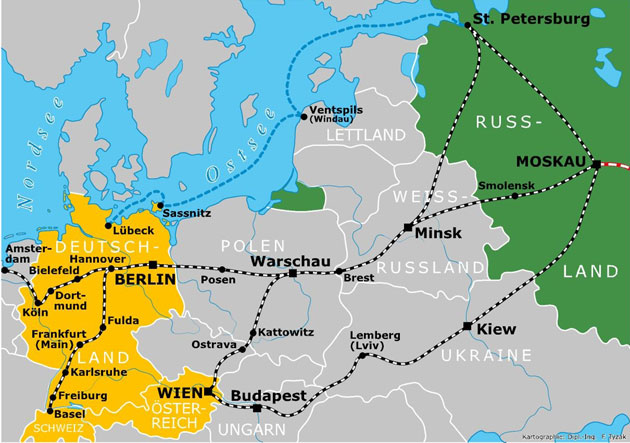I was with the computers, in fact one of the three first HP “systems analysts” in Europe. Calculators and computers did not speak to each other, they were divisions apart – tragically –, but both type of systems “spoke” to measuring instruments, HP’s main fame. The minicomputers were expressedly made for that, earlier on the calculators too.
To get to Moscow we were scheduled on regular, expensive flights. I was familiar with Berlin, and I had a young wife, who like me had never been to Moscow. So I traded my single airplane ticket in for two railway tickets Berlin—Moscow. The plan was to fly from Frankfurt, where we lived, to West Berlin, and to get into the direct train from London and Paris to Moscoe at West Berlin’s Zoo station boarding Saturday eary morning, arriving in Moscow Sunday afternon; some sort of Orient Express. I had reserved a sleeping compartement for the two of us.
In Frankfurt the flight to Berlin was cancelled due to fog. Very familiar with trains I managed to get a night train to Hannover. The Moscow train passed it at two in the morning. So we could step into out long distance train already there, to the astonishment of the conductor (provodnik).
 |
| Frankfurt Sat. 1:56—Hannover—Berlin 7:13—Mokva Beloruskaja Sun. 11:45 today, from here |
Pyjamas prevailed until we approached Moscow. At the Russian boarder all wheels were replaced under us, rumbling, to cater for the wide rails of Russia. And we ate all our bananas, as rumour went that you may not import fruit – just like into Califormia …
In Moscow we stepped out from the White Russian train station and queued up with the Russians for a taxi to bring us to Hotel Rossia (Russia) at Red Square. There we had the driver wait until we had bought some Rubels. All was fine. We joined the rest of the HP crew, my wife staying in the background.
HP’s “office” were two adjacent rooms in a lower class hotel with a bath each. One bath was bath, the other one packing station, its bath tub full of white packing chips. One living room was for customers and prospects, clean and orderly, the other one for personnell retreat and boxes.On the highest box sat the wife of an HP engineer with longer stay in Russia. She quietly read a book, all the time. I think she was depressed from loneliness and despair. Also the rest of the standard crew behaved as in a South pole expedition station.
From the exhibition I remeber that it was a crammy place with too much of our equipment. All visitors were extremely knowledgeable and interested in each and every detail.
I manned the 2116 and had little to do. The acoustic HP instruments from Böblingen were not interfaced, you could just passively plug them in. So I decided to at least make one instrument react to the 2116. We had packed very little software (punched tape reels in white cardboard boxes), especially no assembler. But we had a Basic interpreter running in the 2116.
As aside: I remember the strange look of a customer (in the West), when I showed him a “driver”. At first he may have expected a person, then at least a sizeable piece of hardware, not just a carton box with a reel of paper tape, the size to house a flea circus at the most.)
At least for a whole decade the Basic interpreter was the software to have. Everybody knew Basic. You could do everything with it, special charater edits, mathematics, technical calculations, tables and jokes – later even data base access on disk or disc (a spelling controversy). Only Basic had an interpreter that could show what you had programmed right away. Assembler, Fortran, Algol, Cobol, Snobol and all the others had to be compiled first. Only after a lot of preparation you found out what you had really programmed, often nerve wrecking. The most popular Fortran needed two passes (with one interim output on paper tape) on a normal HP 2116, and even four passes on a small 2115, if I remember correctly. So the 2115 really was for final program execution only.
So I made a Basic “diver” for the acoustic instrument, deep down in the 2116. That was not too complicated. The calling sequence of Basic to its drivers was standardized, and fetching some data from a machine was simple too. You triggered the machine in some way and waited for an interrupt to come back with some data. You ate the data, stored it or not, and asked for more.
The difficulty was that I had to key (switch) in each machine instruction by hand, as I had no assembler at hand. They were few, and I got the two machines to do something. With Basic you could after that easily tweak the data to your liking, print it out, etc.
The Russians were astonished – and we too.
At the end of the fair all calculators were stolen.
If you want to run Basic today, you might like to look at »Basic auf Windows 7« (German).
This post:
https://blogabissl.blogspot.com/2017/10/running-hp-2116-in-moscow.html
More stories?
https://blogabissl.blogspot.com/2017/10/bootstrapping-hp-2116.html
http://blogabissl.blogspot.com/2017/10/the-speaking-modem.html
http://blogabissl.blogspot.com/2017/10/how-i-tried-to-trick-computer.html
http://blogabissl.blogspot.com/2017/10/listening-to-compter-bugs.html

Keine Kommentare:
Kommentar veröffentlichen